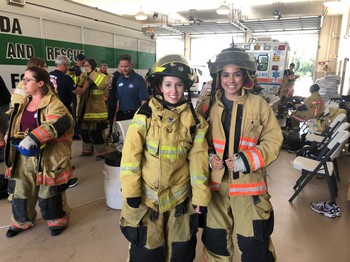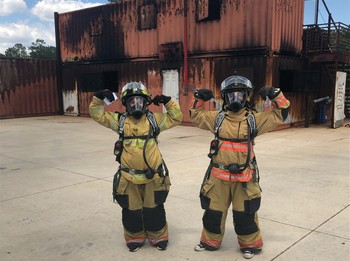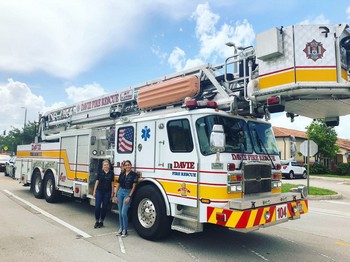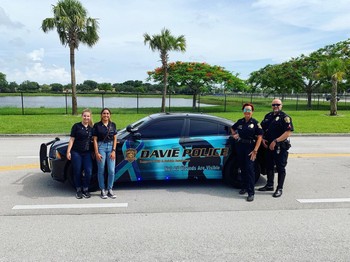Clinical Psychology students participate in firefighter training event
Training intended to give clinicians more insight into challenges of firefighting
When Samantha Rodriguez and Bailee Schuhmann each donned 90 pounds of firefighting protection equipment, they did so not as firefighter trainees, but as NSU Clinical Psychology doctoral students.


Schuhmann and Rodriguez participated in a two-day Clinicians Awareness Course hosted by the Florida Firefighters Safety and Health Collaborative in Bonita Hills, FL. The students were part of a group of 30 clinicians who wore the same gear and participated in a simulated exercise involving rescuing victims from a burning building (which was not actually on fire). The purpose of the exercise was to give clinicians insight into the challenges and stresses experienced by people who work in the fire service.
Although the participants were never in danger and did not experience the stress and peril that firefighters do, Schuhmann said wearing the gear gave her a new perspective on their jobs.
“Your senses get messed with, and you can’t feel anything through the gloves,” she said.
The two-day course was also intended to raise awareness about cancer prevention, mental wellness, health and fitness, and firefighter safety across the state. The participants also toured a fire station and heard stories from firefighters about their experiences with mental health.
“There is a big stigma surrounding mental health and seeking services within the first responder population,” Rodriguez said. “This training has inspired me to continue to work towards changing the culture and removing that stigma so that these individuals can receive the services that they need.”
Professor Vincent Van Hasselt, Ph.D., an expert in police psychology who works frequently with first responders, encourages his students to participate in first responder training to gain knowledge that will help them as clinicians.
“Some knowledge of the nature of the job goes a long way in engaging a firefighter or police officer in the therapy or counseling process,” said Van Hasselt, of the Department of Clinical and School Psychology. “In particular, the likelihood of establishing a positive therapeutic relationship is enhanced when the first responder - client sees that the mental health provider has, at least, a basic understanding and awareness of the challenges they face.”
Schuhmann said the experience was beneficial.
“Anyone who wants to work with first responders should experience this to grasp, to a degree, what the body goes through physiologically,” she said.
Rodriguez found that the experience exceeded her expectations.
“This training will help inform my future work with first responders because it has motivated me to become more involved with this population,” she said.
Following the May training, Rodriguez and Schuhmann spent a day with firefighters and police officers from the town of Davie as part of National PTSD Awareness Day on June 27. The daylong event’s goal was to increase mental health awareness and included visits to the town’s fire stations and police department, located near NSU’s Fort Lauderdale-Davie Campus.

